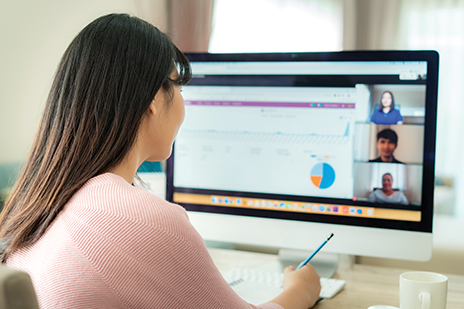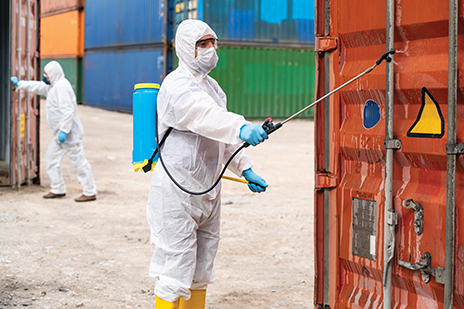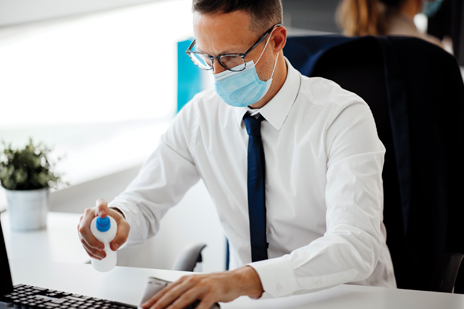COVID-19 has presented unparalleled challenges, which businesses, with no previous experience or contingency to draw on, have had to face without a plan and in real time. As FIDI releases its best practice guide for Affiliates, Dominic Weaver finds how movers can respond and adapt to survive – even thrive – in the wake of the COVID-19 outbreak
The COVID-19 pandemic is a black swan that nobody saw coming,’ says Thijs Deweerdt, Senior Manager at EY Consulting in Belgium. To prove this point, he refers to last year’s FIDI Conference in Amsterdam, where EY ran two workshops on risk management. Participants were asked to list the external risks that could impact on their businesses; while they cited issues such as outsourcing or political and regulatory change, not one delegate mentioned a pandemic as even the most unlikely of potential hazards.
At the time, naming an international health incident as a threat to business would have probably been considered unnecessarily catastrophic, even fanciful, thinking. One year on, however, and businesses are several weeks into navigating just this. COVID-19, the largest global crisis since World War II, is challenging us on multiple fronts, with the heartbreaking human stories it has created, sweeping changes to social behaviour, and impending economic instability we now expect ahead of us.
First steps
In the short term, any company’s first task is to survive the initial shock presented. Mark Oakeshott, of Mark Oakeshott Consulting, says this requires a swift and pragmatic approach to ensure your business stays afloat. This, he says, means ‘conserving cash, collecting receivables and entering into agreements on payables. It has never been more important to separate business from friendship – don’t let emotion get in the way of common sense’.
Next, says Oakeshott, movers should take a similarly tough approach to staff, to ensure they hold on to people who will sustain them through the difficult times ahead and lose those who, perhaps, will not. ‘Focus on retaining your “A” players,’ he says. ‘Make sure the people you really need after we are through this period feel loved.
‘On the other side of the fence, and it may sound harsh, there has never been a better time to let poor performers go for good. You can’t afford to carry passengers in the future.’
Deweerdt adds that flexibility is needed to deal with staff at this uncertain time. ‘Dare to temporarily adapt HR policies to comply with regulations and transitional measures, such as temporary unemployment, and focus on maintaining employee morale and addressing employees’ challenges, such as impaired health, loss of pay, and childcare,’ he says.
Short-term wins
Businesses must evaluate the immediate impact of worldwide lockdowns on their supply chains – and even employ lateral thinking to keep business afloat, often looking for local projects. For example, says Deweerdt, while many moving trucks have been restricted from entering some premises to collect furniture, office equipment or cars, there are also e-commerce providers struggling to keep pace with the increase in demand – so there may be opportunities for short-term local joint ventures.

At this time, relationships with customers have never been more important. Deweerdt adds that proactively contacting clients and shippers to ascertain their new needs is essential. ‘Dare to brainstorm together so new solutions and opportunities can be built,’ he says. ‘A newly moved shipper can, for example, still need help with destination services, installing all furniture, building a garden shed, grocery deliveries and so on.’ He adds that, in these cases, it is essential to be informed about current local regulations and to train staff accordingly.
Business leaders have to be proactive in their decision making, act fast, and prepare for the new normal by reshaping their businesses
Finally, Deweerdt says companies should look at how they can help to play a supportive role in society during an outbreak – not only for the PR, but also because it is the right thing to do. ‘In countries in which the hospitals do not have the capacity to hospitalise new patients, the need for additional beds and space is vast, for example,’ he says. ‘You can let them use a confined part of the warehouse, or even temporarily offer moving containers that can be repurposed and placed outside the hospitals.’

The road ahead
Those businesses that weather the initial storm must next ensure they restructure for the future – in terms of cash control and overall operating model. In the process, says Oakeshott, this gives some moving businesses the opportunity to address changes they had neglected – or refused – to recognise before the pandemic. This might include a reduction in move size and fewer comprehensive three-year assignments, as well as the trend for the consolidation of bigger movers expanding to small and medium-sized players. ‘I don’t see these trends reversing or changing as a result of the crisis,’ he says. ‘Perhaps they will accelerate the pace of those trends.’
He goes on to warn that, when the crisis is over – or at least under control – movers must not interpret the inevitable rebound in business from postponed and new jobs to be a ‘return to normal’. ‘Many companies will be fooled into believing that their current way of working is still OK,’ he says. ‘The reality is that for many companies the model was broken before and will still be broken after the rebound. Failing to embrace technology, refusing to change old processes, and desperately clinging on to an [outdated] overhead and lifestyle is no longer sustainable.’
A seismic change
So, it’s clear that far-reaching change is inevitable for every business. ‘As this crisis further unfolds, leaders and their teams are exploring ways to prepare for the upcoming period of volatility,’ says Deweerdt. ‘It’s critical to navigate disruption and maintain business continuity. Business leaders have to be proactive in their decision-making, act fast, and prepare for the new normal by reshaping their businesses.’
For movers, this will involve implementing two kinds of change: generic transformations such as workplace social distancing – at least for the moment – and more homeworking, and those that are specific to the industry, including virtual surveys and paperless inventory keeping.
But first, and above all, says Deweerdt, comes safety. ‘In all industries… the human aspect is the key priority,’ he says. ‘No-one should be working in an unsafe environment. Employees remain the No 1 asset of your company. Promote remote working as much as possible – and if this is not possible, make sure you have implemented sufficient safety guidelines for onsite work.’
Facilitating digital work
While local government guidelines on working safely should inform safe working practices at the sites of any businesses that have remained working or have re-opened after a period of lockdown, technology could be the facilitator for remote working. While this initially may have meant quickly switching to Zoom or Microsoft Teams to host virtual meetings, in the longer term, companies will need to invest in the IT infrastructure that will enable more comprehensive home working.
Deweerdt says: ‘Make sure you update technologies to ensure stable connectivity and access to company systems, so that people can work safely from home, and think about how you can properly secure data when people are working remotely.’
Some of FIDI’s Affiliates have already made steps that will help this process, he adds. ‘During our FAIM audits, we noticed that many Affiliates have already transformed from paper-based procedures to an entirely digital environment.’
The reality is that for many companies the model was broken before and will still be broken after the rebound
Digitally enabled business allows continuity, both during the crisis and after it, he says. The pre-move survey, for example, currently carries with it a high risk of contamination – a risk that can be mitigated easily though a simple video call with the client, or more sophisticated app-based technology to scan properties and make virtual inventories.
Paperless packing lists allow the noting of items for packing electronically. ‘One of the advantages is that this tool often gives you the opportunity to translate the information into a different language, which could be more convenient for the destination agent,’ says Deweerdt. ‘You can also make the signature box on this packing list mandatory – and, in this way, you will be compliant with FAIM requirements.’
Oakeshott says he expects tech to replace pre-move surveys and inventories, and platforms for customer reviews and business meetings. ‘The notion of the “road warrior” in this industry is dead,’ he says. ‘Only travel when it is necessary.’
Adopting tech-based measures can facilitate your business running smoothly now – but they can also be used in the future, says Deweerdt. There are clear environmental benefits, in addition to improvements in time and efficiency, for those who adopt tech-based solutions, he adds.

Look for liquidity
To ride out the crisis and inevitable aftershocks, businesses need to ensure they are liquid enough to cope, by focusing on effective cash and tax management for the future, says Deweerdt.
‘If applicable, explore government support such as liquidity support and bridge loans; think about capital requirements and consider potential additional cash sources, such as banks, bonds and/or private debt funds,’ he says. ‘It is important for each Affiliate to assess its liquidity situation in this new and volatile market environment that is characterised by uncertain supply, diminishing or fluctuating demand and delayed payments.’

It is vital for companies to build more resilient supply chains to cope with upheavals, present and future, Deweerdt adds. This should involve ‘mapping of current internal and external points of failure that may cause the entire collapse of your supply chain. Make sure you put in place mitigating measures in case a second wave of the pandemic occurs.’
Also, don’t hesitate to take advantage of payment protection plans available to you when the going gets tough. FIDI’s FASI (FIDI Affiliate Secured Invoice) scheme was designed to protect Affiliates’ working capital against the financial default of a fellow FIDI agent. The scheme enables affiliated companies to report overdue invoices, and the payment protection plan covers up to 90 per cent of unpaid invoices in the event of a company going bankrupt or being cancelled from FIDI.
Risk assessment with FAIM
FIDI’s FAIM programme can help Affiliates with the process of mitigating risk, says Deweerdt. ‘Within the FAIM programme, we constantly try to trigger the Affiliates to perform sufficient and frequent risk assessments – for example, with the risk analysis on anti-bribery, anti-trust and the supply chain in general.
‘Last year, we also started with yearly financial assessments using the specially developed EY Credit Risk Barometer (EY CRB). By using the EY CRB, we pro-actively investigate the creditworthiness of each Affiliate. After the pilot period of two years, we will be able to demonstrate to the outside world that FAIM-certified movers are financially stable or at least have mandatory risk-mitigating measurements in place to protect their own company as well as their fellow FIDI Affiliates.’
The global results and analysis of the 2019 FAIM Financial Assessment in the special report from EY, is available on FIDI’s webpage under the ‘news’ section.
A broader definition of risk
As well as the likelihood that we will be living with COVID-19 and adapting our businesses for some time to come, Oakeshott believes it is prudent to take a broader view of risk management than we might have done previously, and to draw up business continuity plans accordingly. After all, if a pandemic can occur, why not an environmental disaster or technological failure?
It is important for each Affiliate to assess its liquidity situation in this new and volatile market environment
‘Document the actions you took during the current crisis that will allow you to react more quickly should it happen again,’ he says. ‘Also, consider other threats, such as a local or widespread cyber-attack. How would you continue work without computers? It doesn’t have to be an elaborate document – just a series of actions that place you in more control.’
The FIDI Academy has recently launched a new webinar course on risk management for international moving companies. To find out when the next session will take place, go to the FIDI Academy webpage or contact Chantal Fera at academy@fidi.org
Road to recovery
Risk management will be an important part of recovery plans that movers should be drafting already for the ‘end of the crisis’. This should detail, as far as possible, what a return to normal will mean for their business. How will it run differently, day to day, compared with before COVID-19? It should ensure that the company can cope with a likely large upswing in volume once restrictions on movement are relaxed – and include flexibility to dial it back once this initial increase calms down. It should also ensure access to enough materials, such as packaging and labour, to run smoothly and keep quality standards high.
Part of this process will be looking at the new business and making decisions about the shape and scope of the services you are providing – you may want to scale some back, or drop them altogether, and develop new services. This requires an open and adaptable mindset; after this crisis, the market will look very different, and your business should, too.
It’s clear that, in spite of the incredibly difficult path moving companies are currently on, this presents a unique opportunity to make far-reaching, positive changes.
‘I truly hope that the industry has learned lessons from the weaknesses that the pandemic has exposed in many companies – that discipline in controlling cash and controlling costs will lead to a more stable business environment in the future; and that companies understand the need to diversify,’ says Oakeshott.
He adds that companies must do all they can to seize, and not waste, the opportunity to revaluate and reinvent themselves. ‘How often do you get the chance to have several weeks to stop and think about how you can be better going forward,’ he says. ‘The future belongs to those companies that have used this time wisely.’
What to do now…
Six priorities for businesses to adapt and thrive in a post-coronavirus world. By Marc Herlant, EY Belgium Strategy and Operations Partner (EY Parthenon)
1. Put people first
a. Personnel plan – put safe arrangements in place for home working or, if this is not possible, establish clear guidelines for the workplace.
b. Use technology – establish connectivity with your workforce so they can work safely from home. Also establish new practices; your daily meeting in the office might become a daily video call, for example.
c. Update your HR policies, temporarily. Use a furlough scheme if necessary and available.
d. Help employees with their challenges – these can include loss of income, securing healthcare, maintaining work-life balance if they are now homeschooling children as well as working.
These new working practices and procedures should make your people comfortable, engaged and productive. Although they may be working alone, they need to feel like they belong.
2. Cash management
a. Look at liquidity – this is vital. This is a very volatile situation and it is unclear where demand is coming from; supply may be uncertain and payments delayed.
b. EY recommends businesses produce a 13-week cash forecast, to identify their requirements for cash.
c. Look at what you can do to improve your working capital and cash position.
d. Look at government support for liquidity and bridging loans.
e. Ask what other sources of cash you have available.
3. Build a resilient supply chain
a. Assess risks in your supply chain in the context of COVID-19 – for example, with external suppliers
b. What happens if your supply chains – of packaging materials or fuel, for example – break down?
c. Look at your current resilience and capabilities – including extras needed, such as site cleaning intervals and disinfection.
d. Come up with alternative sourcing strategies as a contingency.
e. Stock building – of additional resources.
f. Involve suppliers and clients in this process; build relationships.
4. Volatility is the name of the game
There have been huge drops in hospitality and travel, for example, but online services are booming. Think about these new scenarios and how your company will react.
a. Look at demand patterns and how your business will respond.
b. Work with customers – build solutions together.
c. How could demand change in the future?
5. Get a recovery plan in place.
Be ready for the ‘end of the crisis’. What will return to normal look like? How will your business run in this new normal? In moving, this could include thinking about ensuring:
a. You can cope with a large upswing in demand once people can move freely again.
b. You have enough materials and labour available.
6. Transform your business.
Look at the whole – what does the new moving industry normal look like, and how does your business fit into it?
Is it attractive for you to provide the same kind of services, or do you need to drop some or develop others?
In addition to the threats, there will be opportunities. An agile, adaptable mindset is essential.
Further thoughts – EY recommends:
a. Keeping abreast of consumer attitudes and expectations
b. Looking at fundamental changes needed in your business model – take new opportunities and leave those areas that may hold your business back
c. Looking at the capital structure of business in the new economic reality
d. Asking what structural changes are needed?
FIDI is running a series of webinars on moving after COVID-19. On 9 June 2020, the second of these – Think like a big ship, move like a speedboat: Practical steps for a healthy future – will feature the thoughts of Thijs Deweerdt and Mark Oakeshott. Contact marketing@fidi.org for more information
FIDI guide: Best Practices in a Post-Pandemic World
FIDI has released a guide to help Affiliates steer their businesses through the COVID-19 crisis. Best practices for business in a post-pandemic world is available on FIDINET under ‘My Tools’ > ‘Business Tools’

